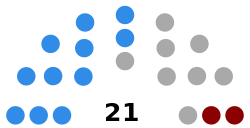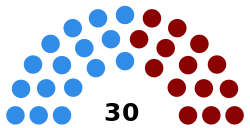Parliament of Barbados
| Parliament of Barbados | |
|---|---|
| 11th Barbadian Parliament | |
 | |
| Type | |
| Type | |
| Houses |
House of Assembly Senate |
| Leadership | |
|
Elizabeth II Since 30 November 1966 | |
|
Sir Elliot Belgrave Since 1 June 2012 | |
|
Kerryann Ifill | |
|
Michael A. Carrington | |
| Structure | |
| Seats | 51 Parliamentarians |
 | |
Senate political groups |
Other parties in opposition
|
 | |
House of Assembly political groups |
|
| Elections | |
| None | |
| First Past the Post | |
Senate last election | The entirety of the Senate is appointed by the Governor-General |
House of Assembly last election | 21 February 2013 |
| Meeting place | |
| Bridgetown, Barbados | |
The Parliament of Barbados is the national legislature of Barbados. It is accorded legislative supremacy by Chapter V of the Constitution of Barbados.[1] The Parliament is bicameral in composition[2] and is formally made up of: Elizabeth II, Queen of Barbados (represented by the Governor-General), an appointed Senate (Upper house), and an elected House of Assembly (Lower house).[1][3] Both houses sit in separate chambers in the Parliament Buildings (commonly known as "The Public Buildings"), in the national capital Bridgetown in Saint Michael.
The Senate is made up of twenty-one Senators and The Queen (therein represented by the Governor-General),[4] while the House consists of thirty Members of Parliament (MPs) in addition to the Honourable Speaker of the House. Members to serve in the Cabinet of Barbados may be chosen by the Prime Minister from either the House of Assembly or Senate,[5] (the Prime Minister alone who must be chosen by the Governor-General must come from the House of Assembly.)[6]
In theory, supreme legislative power is vested in the Queen-in-Parliament; in practice during modern times, real power is vested in the House of Assembly, as the Governor-General generally acts on the advice of the Prime Minister and the powers of the Senate have been limited.[7]
The Parliament of Barbados is originally patterned after the Parliament of England,[8] so the structure, functions, and procedures of the parliament are based on the Westminster system of government.
Sittings of both House and Senate are usually held once per month, with other meetings called as necessary. The House sits on Tuesdays beginning at 10:30am, and are broadcast live on the local radio station, Quality 100.7 FM. Sittings of the Senate take place on Wednesdays.
History
The Parliament of Barbados is the third oldest legislature in the Americas (behind The Virginia House of Burgesses, and Bermuda House of Assembly), and is among the oldest in the Commonwealth of Nations.[9]
The genesis of a legislature in Barbados was introduced by Governor Henry Hawley, creating a structure of governance to Barbados, itself patterned after the Parliament of England). The then unicameral Parliament originally was tasked with establishing a system of laws and was completely under the domination of the island's planter-class. The first meeting of the Barbados Assembly was held in 1639.
The initial location known as the "Sessions House" which was situated in the Marlhill, which is now known as Spry Street. Built by Captain Henry Hawley, the building may have originally accommodated his Courts of Law. (On 25 June 1989, a monument was unveiled to commemorate the site outside of the current Central Bank.)
By 1653, the Assembly moved to the State House then located in Bridgetown area known as Cheapside (then encompassing Broad Street). In 1668 the State House was destroyed by a great fire started by an explosion of the Bridgetown military magazine. Over the next century, the colony’s elected officials assembled at various locations all over Bridgetown, which were rented taverns and homes of local merchants and landlords. The Roebuck Tavern located on Roebuck Street was a favourite assembly point and was also owned by Henry Hawley. The movement of the Assembly among the various taverns in the town eventually presented an irony for the thriving colony. Governor Atkins, who was attending a meeting at Gwynn’s Tavern in 1674 commented, "I must confess I am a little astonished to see so honourable an Assembly to meet in a place so considerable as the island is, and have no house to receive us but a public tavern" (TOB 71). For many years the Barbados Assembly continued to meet in various places. In 1724 an Act was passed providing for a building for the Council and Assembly, Law Courts and gaol. The building located on Coleridge Street was completed in 1731-1732, yet the House of Assembly still often met at times at different private houses and taverns. The current Parliament Buildings were built in the neo-Gothic style in the early 1870s on the site of what was known as the "New Burnt District", which was part of a 10-acre area in the town that was destroyed by the great fire in 1860.
The Parliament of Barbados in its current form was first introduced following the 1961 general elections. In 1963 the colonial era Legislative Council was disestablished. In its place came the Senate in 1964 (due to Barbados' status as a colony of Great Britain). As the years went by, governance in Barbados continued to change in structure until both of the present chambers assumed their present numbers.
Legislative functions
Parliament is empowered by Article 35(l) of the Constitution to make laws for the Peace, order, and good government of Barbados.[10] The Constitution also empowers Parliament to:
- Determine the privileges, immunities and powers of the Senate and the House of Assembly and the members thereof;[11]
- alter or amend any of the provisions of the constitution;[12]
Enactment clause
"BE IT ENACTED by the Queen's Most Excellent Majesty, by and with the advice and consent of the Senate and House of Assembly of Barbados and by the authority of the same as follows:-"[13]
"ENACTED by the Parliament of Barbados as follows:-"[14]
Members in Parliament
As of the election held on 21 February 2013, the Democratic Labour Party held sixteen of the thirty directly elected seats, and the opposition Barbados Labour Party held fourteen seats.
Election date
The next general election in Barbados is constitutionally due in 2018. According to the Constitution of Barbados elections can take place no longer than every five years from the first sitting of Parliament.[15] The last general election was held on 21 February 2013.
The Constitution of Barbados also establishes that at any time before this date the Government in power may seek a new mandate from the electorate and may ask for the current sitting of Parliament be dissolved by the Governor General and allow for the announcement of a new date for General elections.[15] The Governor General of Barbados may also announce a new date of General elections should the Prime Minister in power not survive a vote of no confidence motion.
International affiliation(s)
- ACP–EU Joint Parliamentary Assembly
- Canada-Caribbean Parliamentary Friendship Group
- Commonwealth Parliamentary Association
- Parliamentarians for Global Action (PGA)
See also
- Constitution of Barbados
- List of Parliamentary constituencies in Barbados
- List of Speakers of the House of Assembly of Barbados
- List of Presidents of the Legislative Council of Barbados
- List of Presidents of the Senate of Barbados
- List of Barbadian Members of Parliament
- List of legislatures by country
Notes
- 1 2 Constitution, Chapter V, Part 1; Section 35
- ↑ "Legislative Chambers: Unicameral or Bicameral?". Democratic Governance. United Nations Development Programme. Retrieved 2 June 2010.
- ↑ Parliament of Barbados
- ↑ ConstitutionChapter IV; Section 28
- ↑ Constitution, Chapter VI, Part 3; Section 65(2)
- ↑ Constitution, Chapter VI, Part 2; Section 65(1)
- ↑ "Queen in Parliament". The Monarchy Today: Queen and State. The Barbadian Monarchy. Retrieved 2 June 2010.
- ↑ Gragg, Larry Dale (2003). Englishmen transplanted: the English colonization of Barbados, 1627–1660. Oxford University Press. ISBN 0-19-925389-7. Retrieved 6 February 2011.
The English settlers on Barbados consciously sought to replicate the ways of their homeland, to make their Caribbean colony truly English.
- ↑ Cumberbatch, Jeff (5 May 2010). "Editorial got it right, Mr. Simmons". The Barbados Advocate. Archived from the original on 6 May 2012. Retrieved 7 August 2011.
Barbados’ Parliament, which postdates that of Britain and Bermuda could not then be the third oldest. Perhaps Barbados might take a leaf from Bermuda’s book and describe our Parliament not as the third oldest in the world or the third oldest in the Commonwealth, but truthfully as "the oldest continuous Parliament of an independent Commonwealth country outside the British Isles".
- ↑ Constitution of Barbados Section 48(1)
- ↑ Section 48(2)(3)
- ↑ Section 49(1)
- ↑ 1969 Companies Act., The Official Gazette of the Government of Barbados
- ↑ , University of the West Indies
- 1 2 Constitution: Section 61 (3): "Subject to the provisions of subsection (4), Parliament, unless sooner dissolved, shall continue for five years from the date of its first sitting after any dissolution and shall then stand dissolved. (4) At any time when Barbados is at war, Parliament may extend the period of five years specified in subsection (3) for not more than twelve months at a time:"
External links
| Wikimedia Commons has media related to Parliament of Barbados. |
About
- The Parliament of Barbados - official website
- History of the Parliament of Barbados - Parliament of Barbados website
- Laws of Barbados - Parliament
- Parliament of Barbados profile - Secretariat of the Caribbean, Americas and Atlantic Region of the CPA
Press coverage
- Branford, Albert (13 August 2006). "SAME SEATS". Nation Newspaper. Archived from the original on 2 March 2007. Retrieved 6 June 2010.
- Branford, Albert (24 July 2006). "'Right-sizing' Parliament". Nation Newspaper. Archived from the original on 2 March 2007. Retrieved 6 June 2010.
Other
- Barbados Government Information Network - official website
- "Constitution of Barbados" (PDF). (7700 KB) – Government of Barbados
Coordinates: 13°05′49.15″N 59°36′50.11″W / 13.0969861°N 59.6139194°W
.svg.png)